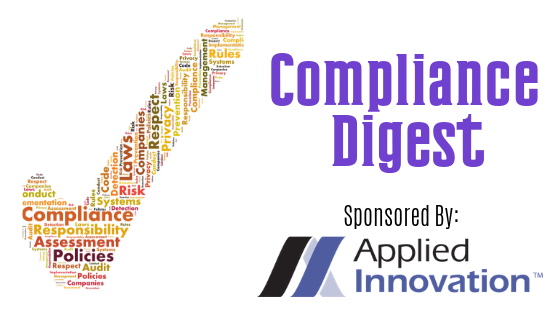Every week, AccountsRecovery.net brings you the most important news in the industry. But, with compliance-related articles, context is king. That’s why the brightest and most knowledgable compliance experts are sought to offer their perspectives and insights into the most important news of the day. Read on to hear what the experts have to say this week.
I’m thrilled to announce that Applied Innovation has signed on to be the new sponsor of the ARM Compliance Digest. Utilizing over 50 years’ experience in the collections industry and over 75 in technology, Applied Innovation is helping to shape the future of accounts receivable management.
Judge Grants MSJ For Defendant Using Bona Fide Error Defense in FDCPA Suit
A District Court judge in Alabama has granted summary judgment in favor of a defendant under the Fair Debt Collection Practices Act’s bona fide error defense after it was sued for attempting to collect a debt that had been discharged in a bankruptcy proceeding. More details here.

WHAT THIS MEANS, FROM ETHAN OSTROFF OF TROUTMAN SANDERS: This is a great win for the collection industry, solidifying the use of the bona fide error defense in situations where collection activity occurs on an account that, unbeknownst to the collector, had been discharged in bankruptcy prior to placement. It also reinforces the importance of a bankruptcy scrub on each new account before collection activity begins.
After reaching the conclusion that a collection letter and credit reporting a balance owed were false representations because they were both in connection with the collection of a debt that had been discharged in bankruptcy, the Northern District of Alabama turned to the issue of whether the debt collector could prove the bona fide error defense. The Court had no trouble concluding that the violations, i.e., false representations, were not intentional and that the debt collector lacked actual knowledge of the bankruptcy discharge at the time of its letter and credit reporting on the account.
The Court then turned to whether the collector proved the error resulting in the violation was objectively reasonable and made in good faith, and whether procedures to avoid the errors were maintained and reasonably adapted to avoid the specific errors in this case. The debt collector established that it received an address from the creditor when the account was placed for collection, performed a bankruptcy scrub before sending its first collection letter based on information including that address, the scrub did not reveal plaintiff’s bankruptcy filing (or a discharge), and if the results had shown a bankruptcy petition or discharge, the account would have been automatically removed from collections.
The Court rejected plaintiff’s argument that the procedures in place were unreasonable because an outdated address was used for the plaintiff during the bankruptcy scrub, which caused the scrub to miss the bankruptcy and discharge. The Court held this was pure speculation, and, even if it was an error to use the address provided by the creditor, that does not mean unreasonable procedures were employed. Instead, the Court reasoned that to hold a debt collector who uses a third party service to verify a debt “cannot rely on the bona fide error defense merely because it used the debtor’s former address it received from the creditor would eviscerate the defense, and would impose a higher standard that than” the FDCPA. The Court ultimately ruled that the “situation here is the quintessential example of an ‘objectively reasonable error’ that was ‘made in good faith’ and constitutes ‘a genuine mistake, as opposed to a contrived mistake.”
THE COMPLIANCE DIGEST IS SPONSORED BY:
Judge Dismisses Allegations Agency Violated FDCPA By Using Local Number to Make Collection Calls
A District Court judge has ruled that using a local area code when attempting to contact an individual is not deceptive conduct under the Fair Debt Collection Practices Act and dismissed one of the counts against a collection agency. More details here.

WHAT THIS MEANS, FROM MITCH WILLIAMSON OF BARRON & NEWBURGER: In Mendoza v Diversified Consultants, the defendant, a Florida based collection agency called the Plaintiff (mother of the actual debtor) who resided in Pennsylvania. The calls were made to Plaintiff’s cell phone, the usual TCPA allegations were made regarding using an ATDS to make calls without permission. Why do we care?
The second issue was that the calls were made using area codes associated with Pennsylvania and not Florida where Diversified is located and led to Plaintiffs allegation that this “use of “false caller ID” constitutes “spoofing” in violation of the FDCPA.”
The Court said no and after pointing out that the same allegation was dismissed when brought by the debtor herself in Bermdez v Diversified explained that there was nothing false about the call if the Pennsylvania number was Diversified’s. No deception, no collusion. The Court pointed out that had a name other than Diversified come up on caller ID, that would constitute deception allowing that a display of “unavailable” would be ok because “no false information was transmitted.” This is because Caller ID laws bar the use of a false name and do not bar the use of foreign area codes.
So where does that leave us, for now using a number with an area code local to the debtor is acceptable. However, I question for how long. Personally, I get an average of two robo calls a day using my area code and exchange, and I am sure many of you reading this experience the same problem. With the current spotlight on robo calls, I can see our industry getting caught in the net as part of the attempt to rein in the scammers and rules be promulgated regarding using an area code other than where a company is actually located. My humble suggestion, support the various trade groups who represent your interests and are working to make sure this does not happen. As a wise man once said, “if you’re not sitting at the table, you’re probably on the menu.
Newly Overhauled and Bipartisan Version of Anti-Robocall Bill Introduced in House
Have you ever watched a movie or a TV show where a bunch of people have to get through a maze and the first one to get to the end wins? That sort of describes how Congress is handling its attack on robocalls; a lot of different people moving in multiple directions and the first one that gets out, wins. More details here.

WHAT THIS MEANS, FROM RICK PERR OF FINEMAN KREKSTEIN & HARRIS: Technology-based call control (I refuse to call them robocalls) is not going away any time too soon. It has bipartisan congressional support and strong public support. The ARM Industry needs to come to grips with the fact that legislation such as this, which is actually barring the use of technology instead of content, in here to stay. As ACA and other trade groups are communicating with legislators in an effort to prevent blanket prohibitions, stakeholders need to be prepared to continue to only communicate with consumers on their cell phones by using manual means or by having consent to call. For now, the findings in ACA v FCC remain good law and pot-shot efforts to reverse it legislatively have not gained any steam.
Defendant Settles TCPA Collection Call Case for $10.75M
Cox Communications has agreed to pay $10.75 million to settle a class-action Telephone Consumer Protection Act lawsuit that claimed it made collection calls using an automated telephone dialing system to an individual’s cell phone without her consent. More details here.

WHAT THIS MEANS, FROM JUNE COLEMAN OF CARLSON & MESSER: TCPA cases are almost always pled as class actions, especially when the defendant is a large company. The exposure in such cases can be astronomical, making settlement very attractive, even a large settlement. The TCPA case of Knapper v. Cox Communications demonstrates this dynamic. The Knapper case alleges that Cox Communication called Plaintiff 11 times, and that Plaintiff has no relationship with Cox, i.e. a wrong number TCPA case. In this case, Plaintiff alleges that Cox Communications serves 6 million residential customers, and Plaintiff argued there were 600,000 putative class members. Even with the lower $500 statutory damages per call and assuming only one call per putative class member, that is a very conservative $300 million exposure.
And be clear, as in most of these cases, liability was strenuously denied, and Cox was quick to point out to the Court in an initial filing that this case was not suitable for class certification, and numerous courts have found wrong number TCPA cases inherently unsuitable for class treatment. (See, e.g., Davis v. AT&T Corp., No. 15CV2342-DMS (DHB), 2017 WL 1155350, *5 (S.D. Cal. Mar. 28, 2017).) In the Davis case, the defendant AT&T took advantage of its large customer base by arguing that even for a consumer who received a wrong number call for a specific account, the parties would need to determine if the wrong party was a customer of AT&T who had consented to such calls. Also, if an AT&T customer provided AT&T with the number and therefore consented to the use of the wrong party number, an individual investigation would need to determine who had authority to consent to the call. Also, judges in a growing number of TCPA cases have rejected class certification recognizing that the identities of class members are not readily ascertainable from their phone numbers.
Nonetheless, nearly nine months after the class certification motion was filed, the Court ultimately did not agree that these issues prevented class certification, and granted class certification. The Court found that consent could be handled on a class-wide basis and that reverse look up services, combined with means to verify their results, will reasonably identify class members. Of course, this appeared to be a lengthy, and some might say arduous (expensive) process. After the Court certified that case as a class action in February 2019, Cox Communications immediately appealed to the Ninth Circuit, but the parties also spent 3 months negotiating a settlement.
Wrong party class actions under the TCPA, and really TCPA class actions in general, can be difficult, and fighting a class action is expensive. There are certainly a growing number of cases questioning the suitability of class certification in TCPA cases given all the ways that consent can be given, especially when the putative class members may have had many contacts with the defendant. But the risk of exposure is great. And it would appear that a $10.75 million settlement was a good business decision given the risk of exposure, even though Cox Communication put up a good fight, and had an appeal pending in the Ninth Circuit seeking review of the class certification decision.
Judge Dismisses TCPA Case Because Plaintiff Never Stated Calls Were Made Using ATDS
A District Court judge in Illinois has granted a defendant’s motion for judgment on the pleadings after it was sued for allegedly violating the Telephone Consumer Protection Act by calling an individual on his cell phone without obtaining consent because the plaintiff failed to state in his complaint that the defendant used an automated telephone dialing system when making the calls. More details here.

WHAT THIS MEANS, FROM NICOLE STRICKLER OF MESSER STRICKLER: Bader’s strict application of the TCPA’s definition of autodialer continues the split in authority around the country after the D.C. Circuit’s rejection of the FCC’s 2015 definition in ACA International. Courts in line with Bader have held that a plaintiff adequately alleges the use of an autodialer only when it plausibly asserts the defendant used equipment that can (1) generate numbers, either randomly or sequentially and (2) dial such numbers. To the contrast, other courts continue to hold that the ability to communicate automatically from a stored list of numbers, even without employing a random or sequential number generator (as required by statutory language), may trigger TCPA liability. Likely the first clarity we will receive will be from a new FCC ruling, if and when that occurs.
Judge Rules Case Involving Potential Third-Party Disclosure Can Continue
A District Court judge in Alabama has partially dismissed a plaintiff’s motion for summary judgment and partially granted a defendant’s motion to dismiss after it was sued for allegedly violating the third-party disclosure provisions of the Fair Debt Collection Practices Act during a conversation with the plaintiff’s mother. More details here.

WHAT THIS MEANS, FROM BOYD GENTRY OF THE LAW OFFICE OF BOYD GENTRY: This decision is such a disappointment. The FDCPA was not designed to encourage such lawsuits. This decision leaves slim room for a collector to explain to a third party the reason for the call. If a collector is not permitted to say something like “personal business matter”, a more vague response would likely cause alarm (as if the collector was involved in a scam). Thankfully, this is not the law everywhere. The Sixth Circuit has taken a more reasonable approach to this issue and would have dismissed the complaint. I suppose this court would prefer that the collector say “federal law does not permit me to disclose the reason for my call.” I prefer a more human response.
New Anti-Robocall Bill Cleverly Named, Officially Introduced in Senate
Following up on a report last week, a bill has been introduced in the Senate by Sen. Catherine Cortez Masto [D-Nev.] that would criminalize robocalls, with the intention of putting perpetrators behind bars. More details here.

WHAT THIS MEANS, FROM HELEN MAC MURRAY OF MAC MURRAY & SHUSTER: Anxious to be the people who end robocalls, several Democratic senators have introduced a bill purportedly criminalizing robocalls. The bill, however, is duplicative of current criminal applicable statutes, likely constitutionally vague and ineffectively increases penalties. Federal and state prosecutors already regularly utilize criminal wire fraud and RICO conspiracy statutes to pursue robocallers. The bill also doesn’t define terms like “message,” rendering the bill unconstitutional, and considering the volume of robocalls typically made, worthlessly increases penalties from upwards of $100 billion to $200 billion.
Thanks again to Applied Innovation — the team behind ClientAccessWeb, Papyrus, PayStream, and GreenLight — for sponsoring the Compliance Digest.










